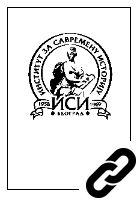2. Naučni članci
-

-
"Horizontalna kolaboracija" - intimne veze žena sa nemačkim okupatorom u Srbiji 1941-1944.
-
Članak se bavi okolnostima pod kojima su žene stupale u
intimne veze sa nemačkim okupatorom u Srbiji tokom Drugog svetskog
rata. Analizirani su politika i odnos antifašističkih pokreta prema
takvim ženama, kao i društveni značaj koji su te veze imale., Intimate fraternization with occupying forces was typical phenomenon for all territories under German occupation during World War II. Although it depended on the regime of occupation, number of the occupying
forces and general sympathies towards Nazism, it became the most detested form of collaboration. Women fraternization with Germans was condemned since it was considered betrayal of national and patriarchal norms
and morals. Cutting of women’s hair became a method of punishing women
for intimate relations with German soldiers by Ravna Gora Movement during the occupation. On the other hand, after liberation, People’s Liberation
Movement organized trails for women charged for ’horizontal collaboration’. Punishment by cutting hair as well as post-war trails, beside real
charges for sexual relationships had, in numerous cases, background in
ideological disapproval. Concealing ideology behind sexual charges was an
attempt of women gender degradation and deprivation of their right on
equality and emancipation. The gender differentiated treatment of collaboration was an attempt to re-establish male dominance and traditional
gender roles.
-

-
Prosvetni radnicu u u ideologiji vlade Milana Nedića 1941-1944
-
Članak se bavi odnosom komesarske uprave i Vlade Milana Nedia 1941–1944, prema prosvetnim radnicima u Srbiji za vreme
nemačke okupacije tokom Drugog svetskog rata. Analizirana su ideološka očekivanja, propaganda i politika vlasti prema prosvetnim radnicima.
Rad je pisan na osnovu arhivske građe, štampe i literature., In occupied Serbia, High school education was remodeled as important
ideological tool of the collaborationists Serbian government. According to the
standpoints of the Government, teachers should act as propagators of the ideology that governement have wish to spread inside of the schooling system in Serbia. Most of the tasks were spreading anti-communist propaganda, contolr of
over the pupuls, especiaally in later grades of the high school and to be engaged
in all Government propaganda efforts. It oculd be said that they were overburnd
with the obligations with specific ideological contence. On the contrary to Government proclaims, most of the teachers, showed passive or active resistance,
despite the huge efforts of the Government to establish the firm control over
them. Some of those efforts included transfer to other areas or dismisal from the
service, but in some harsh cases even sending to the prisons and camps., Published


